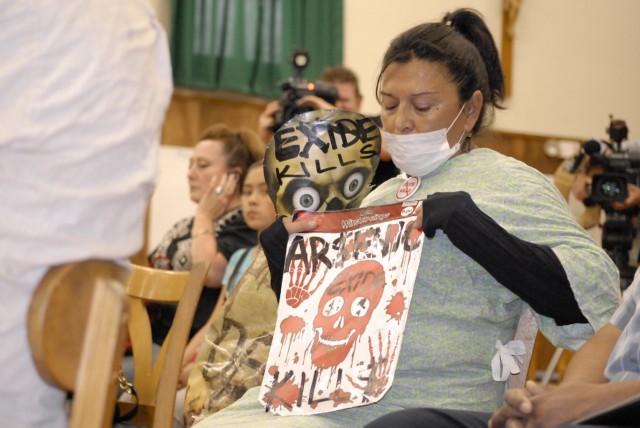But some community groups were unconvinced.
“They’re trying to put lipstick on this pig,” responded Monseigneur John Moretta. He's pastor of Resurrection Catholic Church in Boyle Heights, a blue-collar, largely Latino community next to Vernon.
Moretta added that he won’t be satisfied until the plant is closed.
The soil testing and remediation plan went to the state Department of Toxic Substances Control, which regulates ground contamination. The $5 million anti-pollution plan falls under the authority of the South Coast Air Quality Management District, charged with protecting air quality.
Liza Tucker of the public interest group Consumer Watchdog questioned this division of authority over what she described as a persistent and unrepentant polluter.
“What needs to happen is to regulate in a completely different way, to give companies like that a master permit, coordinated between the air district and the DTSC,” Tucker said.
“(Regulators) need to get together and say, ‘OK, what are we concerned about here and what do we do to make sure it doesn’t happen?”
Instead, Tucker said, the company has played different regulatory agencies against each other, avoiding effective controls on its behavior.
Long History of Violations
The battery recycling plant has operated since December 1981 on an “interim permit.” Since then, it has never satisfied regulators that it meets the state’s rules for the safe operation of such toxic sites. Exide has been cited repeatedly for letting lead and arsenic leak into residential neighborhoods less than two miles away.
Lead is a neurotoxin that can cause learning disabilities and behavioral problems in children.
The Air Quality Management District disclosed last spring that Exide’s arsenic emissions posed a cancer risk to more than 100,000 people living nearby.
Two weeks ago, the Department of Toxic Substances Control announced that tests of homes and schools near the plant detected lead levels exceeding 40 milligrams of lead per kilogram of soil. That’s about 40 parts per million, the level at which state guidelines recommend additional testing.
The department warned residents of Boyle Heights and Maywood, just east of downtown Los Angeles, to keep children away from areas of bare soil and to wash their hands thoroughly, especially when they come inside. Residents should put door mats inside and outside entrances to their homes, only grow produce in raised planter boxes and thoroughly wash any home-gown produce before eating it, the agency warned. It ordered additional testing and strategies to protect residents.
Expansion of Lead Testing
The first soil tests took samples from 39 homes and two schools within two miles of the plant. Exide’s new plan, submitted Friday, expands soil testing by 1.9 square miles and includes 59 additional properties. At homes where lead has already been found in concentrations exceeding 40 parts per million, and that are inhabited by pregnant women or young children, Exide may cover bare soil or vacuum the ground, according to the most recent proposal.
The first round of testing found lead concentrations exceeding the state Department of Public Health’s defined hazard level for bare soils where children play of 400 milligram per kilogram of soil, or approximately 400 parts per million. At those properties, the company plans to remove soil. The plan didn’t specify how much.
As for Exide’s plan to curb air pollution, Sam Atwood, a spokesman for the South Coast Air Quality Management District, noted that the company continued to receive citations for violating air quality rules.
Those alleged violations include one this month for failing to report emissions promptly and two in January for temporarily removing part of the roof while work was underway on battery-crushing equipment. That may have released toxic fumes, but Exide failed to notify authorities or warn the public, air district documents claim. Exide also received a citation in January for releasing too much lead into the atmosphere.
Further, the company has sued to block an air district order that its blast furnaces achieve “negative pressure” to prevent toxic emissions from escaping, Atwood said.
[contextly_auto_sidebar id="QrHpQphj8NXCtvfC1HOdhzug1nUBHiHv"]
